Scholarly Concentration Areas
-
Basic Research
Basic Science Scholarly Concentration:
The major goal of the Basic Science Concentration is to provide committed medical students with a mentored basic research experience. This scholarly experience is expected to cultivate scholarly habits of inquiry and exploration. The basic science scholarly option will be for those students that wish to conduct basic bench or applied research. Students with previous basic research experience are strongly encouraged.
First, the student is expected to identify a scholarly mentor in an area of interest. The mentor should be a faculty at WSU or their affiliated institutions. The scholarly project is expected to be longitudinal across the student's curriculum. The mentor along with the student will be expected to develop an individualized project, establish time lines for completion as well as the expectations of the final product.
This mentored experience is expected to enhance the student's ability to formulate a hypothesis, analyze scientific literature, gain skills in research design and develop a stronger understanding and use of statistical methods. It is anticipated that students who are educated in a research environment are stimulated to seek a deeper understanding of health and disease, making them better physicians.
Area Director
Noreen Rossi, M.D.
nrossi@wayne.edu -
Population Health
Population Health subgroups include but are not limited to: sickle cell, cystic fibrosis, transplant, cancers, etc.
Area Director
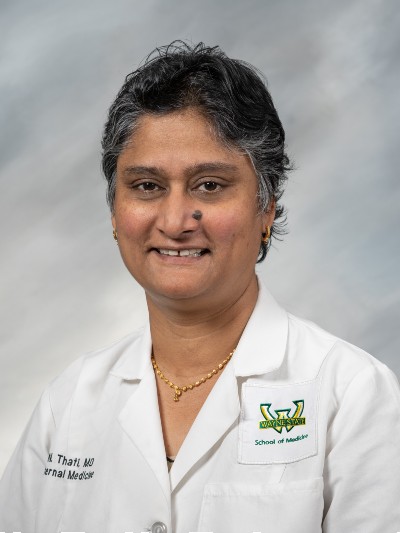
Neelima Thati, M.D.
nthati@med.wayne.edu
-
Medical Education
The medical education scholarly concentration provides an opportunity for students interested in medical education to develop the knowledge and skills necessary for a career in academic medicine. The concentration curriculum is built around experiential learning in which students will complete a project that will enhance their understanding of the curricular development, the educational process, educational delivery, educational outcomes, and continuous quality improvement in education. Students interested in the medical education concentration do not require previous experience in medical education; however, they should possess an interest in the field and eagerness to learn. Students selecting this concentration will work closely with a mentor of their choosing and select a project related to one of the following: Educational outcomes; Curriculum development; Educational innovation; or Comparative educational research. Students may also perform a scoping review, systematic review or meta-analysis related to one of the above topics.
Students will be required to: Define the preliminary problem, Perform a literature review, Summarize the literature, Define outcomes including specific outcome measures, Write a project proposal, submit an IRB to the appropriate section (if appropriate to the project), Analyze results, Write an summary, abstract, and if appropriate a manuscript
Student will be expected to define a time line and meet regularly with their mentor. Regular project status reports are required.
Area Directors
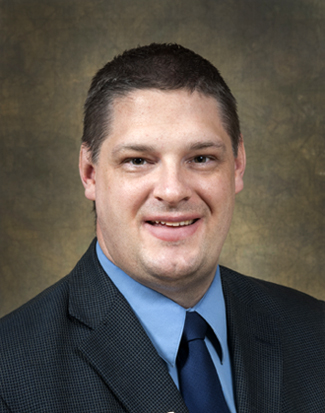
Jason Booza, Ph.D.
ah0201@wayne.eduJason Booza, Ph.D., is the assistant dean of Continuous Quality Improvement and Compliance for the Wayne State University School of Medicine.
His heads the Office of Assessment, Accreditation and Continuous Quality Improvement, which is responsible for the School of Medicine's Liaison Committee on Medical Education accreditation process. The office also monitors the quality of programs within undergraduate medical education programs and facilitate quality improvement projects.
An assistant professor of Family Medicine and Public Health Sciences, Dr. Booza has taught courses in the master's of Public Health program and for WSU's Department of Urban Studies and Planning. He lectures on applied research methodology across the university and is course director for the School of Medicine's Medical Education and Evaluation co-curricular program.
He received his bachelor's degree in Criminal Justice in 1999 from the University of Detroit Mercy, his master's degree in Sociology in 2003 from Wayne State University and his doctoral degree in Political Science in 2009, also from WSU.
Diane Levine, M.D.
-
Women's Health
The Office of Women's Health (OWH) at Wayne State University was founded to improve the health of women over the life span through five pillars:
1) Research and Development
2) Education and Health Literacy
3) Implementation Science
4) Policy and Healthcare access
5) Women in the STEM fields.
Choosing Women's Health as a Scholarly Concentration would mean engaging in one or more of these five pillars. Previous experience that would be important include the five pillars.Mentorship
The SC Project Mentor may be a faculty or an expert in the defined area. If the SC Projector Mentor is not a faculty, then there must be a WSU faculty to serve in the role of a Faculty Co-Mentor or Sponsor. For the women's health scholarly concentration, students are expected to initiate contact with potential mentors. Mentors chosen by the student are expected to agree to certain expectations and requirements set by the Office of Women's Health, otherwise, they would not be approved. Students would meet with their mentors at least every 4 weeks to discuss progress and challenges. Students will develop their individualized research proposal with their mentor, and once approved by the SC director, students will begin to work on their project. Timelines must be in 12, 24, or 36 month lengths.
Requirements
For a student to achieve a women's health scholarly concentration, certain requirements must be met. Checkpoints for student's progress will be every 3 months (for 1 year projects) or 6 months (2-3 year projects) during which the scholarly concentration director will meet with the mentors and students in order to ensure students are meeting expected milestones. Academic Product – Each student will plan to create an academic product and this should be defined in the project proposal. All students chosen to participate in the SC program are expected to present their work both in a poster format (during the research day) and oral presentation (during the annual SC event).
Curriculum and SC Program Structure: All students who are selected for the SC program are expected to complete a common core curriculum. Topics in the core curriculum will include: Literature search, Evaluating the evidence, Research methods, Study design, Research paper writing, Presentation skills. After completion of core curriculum, women's health scholarly concentration students are expected to attend seminars and discussions specific to the women's health scholarly concentration. Additionally, monthly journal clubs will be held during which students will prepare and discuss articles. Students will also present one presentation per year on their research area/topic. The timeline and schedule of meetings would be designed to fit the students' academic schedules.
Area Director
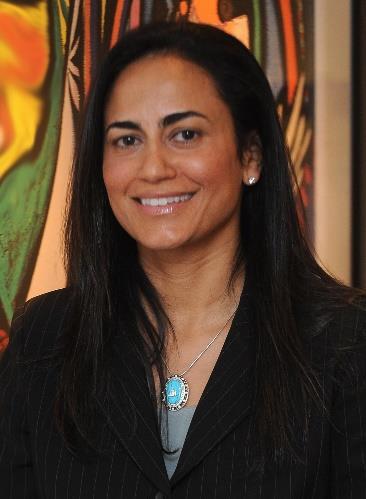
Sonia S. Hassan, M.D.
ad8024@wayne.edu
Associate Vice-President, Office of Women's Health, Wayne State University Professor, Obstetrics and Gynecology, Division of Maternal-Fetal Medicine Wayne State UniversitySonia S. Hassan, M.D. is associate vice-president at Wayne State University (WSU), a professor of Obstetrics and Gynecology and the founder and director of The Office of Women's Health at WSU as well as WSU's Make Your Date Program, an implementation science program to reduce preterm birth, the leading cause of infant mortality. Dr. Hassan is co-chair of Michigan's Maternal Infant Health and Equity Collaborative. Dr. Hassan leads a State of Michigan Collaborative for COVID-19 in Pregnancy and the Newborn - a research group composed of 12 institutions and hospitals that care for over 50,000 deliveries annually.
Dr. Hassan has authored or co-authored over 400 publications and was the lead author of a landmark international trial which demonstrated an intervention that decreases preterm birth by 45%. Dr. Hassan has been an NIH funded researcher for the past 17 years and previously served as the project site manager for the Perinatology Research Branch of the National Institute of Child Health and Human Development of the National Institutes of Health on behalf of WSU.
Dr. Hassan was named the Crain's 13th Annual Health Care Heroes Awardee and a Michiganian of the Year by the Detroit News. She received the March of Dimes Michigan Prematurity Prevention Hero Award and was the honoree of the Michigan March of Dimes for 2018. In 2019 she was the recipient of the Rogerio A. Lobo Award from the Society for Reproductive Investigation.
Dr. Hassan is a Fellow of the third class of the Aspen Institute's Health Innovators Fellowship and a member of the Aspen Global Leadership Network. She completed her Bachelor of Arts at the University of Michigan, Medical Degree at Wayne State University and Masters in Business Administration at Ross School of Business at the University of Michigan.
-
Global Health
Koplan et al, 2009, defines global health as the "A field of study, research, and practice that places a priority of achieving equity in health for all people. Global health involves multiple disciplines within and beyond the health sciences, is a synthesis of population-base prevention with individual level clinical care, promotes interdisciplinary collaboration, and emphasizes transnational health issues and determinants." The Global Health concentration is built on the Global and Urban Health Equity (GLUE) certificate program which is a 2 year long comprehensive curriculum based on the Consortium of Universities for Global Health Interprofessional competencies, and developed by the Wayne State University Global Health Alliance (WSUGHA). GLUE comprises monthly didactics, (local and/or international) community engagement, and mentored team-based capstone projects that are community-driven, ethical, equitable, and built on long-term partnership & sustainability. Local partnerships are with First Aid First, Freedom House Detroit, Samaritas Transitional Housing, and the Global Health Research Collaborative. International partnerships are with Child Family Health International (Virtual opportunities in Bolivia, Uganda, Ghana, Mexico, and Ecuador) and Child Health Education Initiative (CHEI), India. See more at www.wsugha.org.
The Global Health Concentration is a more intensive experience with includes pre-requisites in the first 2 years which include community engagement, healing between the lines, and World Health Students Organization (WHSO) educational experiences as well as some online global health modules, and the WHSO-WSUGHA Global Practitioner Series. Students may also audit GLUE didactic sessions.
Scholars will be expected to disseminate their scholarship/service/advocacy outputs and are encouraged to be creative and innovative in their work and dissemination.
Scholars will have opportunities to distinguish themselves through global health advocacy and leadership.
Area Director
Kristiana Kaufmann, M.D.
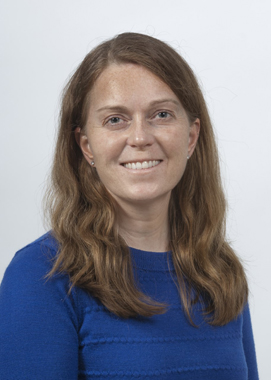
aj6912@wayne.eduKristiana Kaufmann is an Associate Professor in the WSU Department of Emergency Medicine and the Director of the Global and Urban Health Section and the International Emergency Medicine Fellowship at the Wayne State University (WSU) Department of Emergency Medicine. She is also the co-director of the WSU Global Health Alliance and its Global and Urban Health Equity Scholars Program. Dr. Kaufmann is the American College of Emergency Physicians Ambassador to Lao People's Democratic Republic through her long standing work with Health Frontiers, including development of and director of the new Lao EM residency training program. She created the Hands-On Practical Emergency Skills (HOPES) first aid training for incoming students in the WSU School of Medicine and is faculty adviser for the First Aid First WSU student organization aimed at teaching first aid in the Detroit community. Dr. Kaufmann is the Eastern Michigan Region Medical Director for the National Ski Patrol and actively patrols as a Senior patroller and Outdoor Emergency Care course director at Alpine Valley Ski Patrol in White Lake, Michigan. In her spare time, she likes to play catch with her dogs Mork and Mindy and play ping-pong with her family.
Dr. Kaufmann received her BS at U of Michigan in Cell and Molecular Biology. She completed MD at WSU in Detroit, MI. She completed her EM Residency at U of Cincinnati. She completed an MPH and International and Global Health Fellowship at U of Illinois at Chicago. She then spent one year living in Lao PDR volunteering with Health Frontiers.
-
Public Health, Advocacy, and Community Engagement
The Public Health, Advocacy and Community Engagement scholarly concentration give students the opportunity to explore their role as a future physician in the context of a "community" in a more in-depth way than traditional medical education allows. The students will be able to identify an interest in public health, health advocacy and/or community engagement via a wide variety of case studies, seminars/webinars, and other experiential educational opportunities, led by experts in the field and community partners. Upon completion of core SC requirements, the student will develop an academic scholarly project to address an issue affecting public health, at a micro, meso or macro level in the "community". Such issues can include, but are not limited to health advocacy, health equity and justice, policy, disaster preparedness/responsiveness, food/housing issues, community identified issues, and more.
The project proposal will be developed and executed by the student and advised by a mentor. To identify an effective mentor, the student should consider experience with public health, involvement in organized medicine and/or legislative activities, involvement in community engagement projects, and/or expertise in health advocacy. The proposal will be subject to approval from the SC Area Director.
Projects can involve community-based participatory research, policy exploration and referendums, models of service delivery, etc. The final project should be refined and structured for formal presentation and publication.
Area Directors
Latonya Riddle-Jones, M.D.
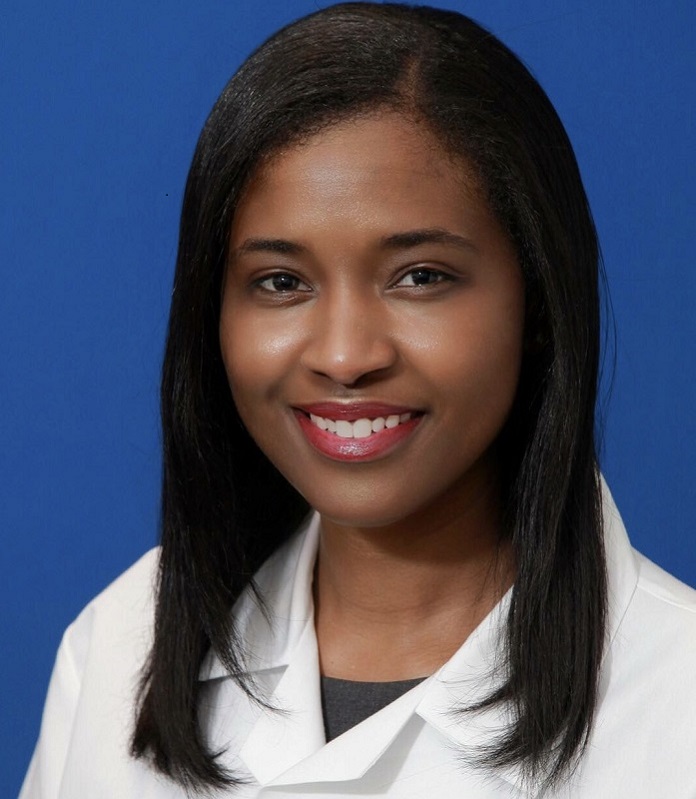
an7617@wayne.eduDr. Riddle is a proud Chemical Engineering graduate of Michigan State University, Wayne State University School of Medicine (WSUSOM) and DMC/ Wayne State University School of Medicine Internal Medicine- Pediatrics Residency program. She practiced at St. Joseph Mercy Hospital for 2 years upon graduation, and served as Clinical Instructor for University of Michigan Med/Peds program while there. Here at Wayne State University, she is an Assistant Professor, Medical Director for the Corktown Health Center (a medical home for Detroit's LGBTQ community), Associate Medical Director for the Tri- County Breast and Cervical Cancer Control Program, faculty mentor for FitKids360 at WSU School of Medicine (an obesity treatment program for children), and serves as a representative on the Diversity and Inclusion Committee for the Department of Internal Medicine.
Her research interests include obesity prevention and treatment, effects of the Affordable Care Act on safety-net programs, and the performance of engineering students in medical school, while her clinical interests include addressing the medical needs of the LGBTQ community, asthma, diabetes and obesity. She is a proud wife, and mother of two. She loves ambulatory medicine, and her goal is to keep patients out of the hospital by staying on top of their preventative health needs – mind, body and spirit -
Urban and Environmental Health
The Center for Urban Responses to Environmental Stressors (CURES) (P30 ES020957) is an NIEHS-funded environmental health sciences core center headquartered on the Wayne State University (WSU) campus. The CURES Urban and Environmental health sciences option provides committed medical students with a mentored experience in translational, mechanistic, or population-based environmental health science research.
The CURES team aims to understand and mitigate the adverse health impacts of exposures to chemical and non-chemical stressors in a complex urban environment. CURES recognizes that each urban neighborhood has a unique combination of geographic (e.g., locale relative to pollution sources), historic (e.g., land use, age and condition of housing stock), and demographic (e.g., socioeconomics, race, ethnicity, age) characteristics that together create the spectrum of environmental risk and injustice that result in disparities in the development of adverse health outcomes, such as preterm birth, cancer, and diabetes. CURES researchers believe that a community-engaged, transdisciplinary team-science approach is essential to address the major environmental health problems.
Students who are interested in environmental health sciences research should identify a scholarly mentor from the CURES faculty roster. The mentor should be a faculty member at WSU, Henry Ford Health System, or affiliated institution. The scholarly project is expected to be longitudinal across the student's curriculum. The mentor along with the student will be expected to develop an individualized project, establish a time line for completion as well as expectations for the final product.
This mentored experience will enhance the student's ability to formulate a hypothesis, analyze scientific literature, gain skills in research design, and develop a deeper understanding of statistical methodologies, data transparency, data visualization approaches and "big data" analysis. The goal is to develop a new generation of physicians who are equipped to serve as the vanguard of environmental disease prevention and environmental health equity in our urban community.
Area Director
Melissa Runge-Morris, M.D.
mrungemo@med.wayne.edu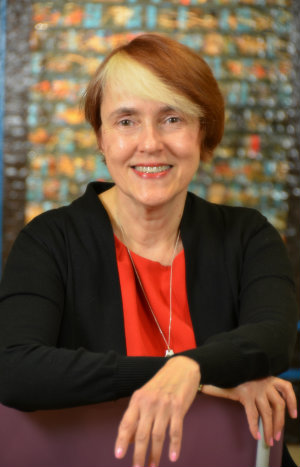
Dr. Runge-Morris' primary research program is dedicated to understanding the molecular mechanisms that regulate the expression of the sulfotransferase multigene family. The cytosolic sulfotransferase conjugating enzymes are vitally important to drug metabolism. These enzymes detoxify many xenobiotic and endogenous substrates by forming more polar products that are amenable to excretion and elimination from the body. However, if the sulfated conjugate is unstable, loss of the labile sulfate group can create highly reactive electrophiles that may damage cellular macromolecules such as DNA. Many of the sulfotransferases in liver and other tissues, have been implicated in the bioactivation of environmental carcinogens. In addition to these important biological functions, the sulfotransferases also modulate intra-tissue hormone activity. Because sulfated hormones generally are receptor inactive, induction of sulfotransferase gene expression can reduce the levels of bioactive steroid hormone that are available to bind to cellular receptors. In human pathology, the sulfotransferases are in a prime position to influence the development and progression of hormone responsive tumors such as breast and prostate cancer.
Dr. Runge-Morris' laboratory is currently investigating the key transcription factor and cis-acting response elements that are responsible for regulating changes in sulfotransferase gene transcription. Recently, her research group reported that glucocorticoid hormones and xenobiotics such as 2,3,7,8-tetrachlorodibenzo-p-dioxin (TCDD) and phenobarbital produce differential effects on the mRNA expression of individual sulfotransferase isoforms in rat liver and in primary cultured rat hepatocytes. As an overall research objective, Dr. Runge-Morris maintains that identifying and characterizing the factors that control gene expression during critical periods of development and aging will lead to new insights on disease mechanisms in humans.